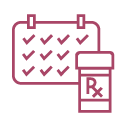Consistent and appropriate medication regimens are crucial for healthy outcomes. As prescriptions and dosing schedules have grown more complex, however, adherence has become more challenging. This is especially relevant among people who are older or who have chronic diseases.1 Pharmacists and other healthcare providers (HCPs) may work to optimize medication regimens for effectiveness, but individual habits and routines also play an important role in outcomes for health plan subscribers.
We’re familiar with behavioral changes aimed at improving lifestyle factors like diet, exercise, tobacco use, and sleep hygiene.2 Can payers use a behavioral approach to promote medication adherence? And will better adherence lead to improved outcomes and reduced care utilization and costs?
Examining the behavioral drivers of medication adherence
Poor medication adherence has been linked to 10% of annual hospital visits, resulting in approximately 125,000 deaths and $100 billion in healthcare costs each year. Individuals with chronic illnesses tend to struggle with adherence disproportionately—especially those with asymptomatic disorders on long-term medication regimens in which a missed dose has no immediate consequence.1 For example, people with hypertension may not be overly concerned about occasionally forgetting to take their beta blocker.
This describes present bias, or hyperbolic discounting, a concept in which people disregard long-term benefits and goals in favor of immediate rewards.1,3,4 Cognitive biases like this affect healthcare decision-making and can lead to nonadherence.1 Other inconsistent behaviors can be explained with different behavioral theories:
The Theory of Planned Behavior
expands on the Theory of Reasoned Action, postulating that behaviors are planned and deliberate based on an individual’s perception that they can do so.5,6,7,8
The Health Belief Model
suggests that behaviors are based on individual perceptions of personal risk and susceptibility and the convenience and benefits of intervention.11,12
Social Learning Theory
predicts individual behaviors based on a combination of “cognitive, behavioral, and environmental influences.” 9,10
Social Cognitive Theory
expands on Social Learning Theory by focusing on an individual’s observations of others and their own belief that they can accomplish an action.9,11
A key concept of the Theory of Planned Behavior, perceived behavior control describes an individual’s willingness and ability to perform an action.13 As part of Social Cognitive Theory, self-efficacy refers to an individual’s personal belief that he or she can accomplish an undertaking.9,11,14 However, these may not reflect the likelihood that the necessary behavioral change will be implemented in practice.
Health Belief Model in medication adherence
According to the Health Belief Model, behaviors can be predicted based on perceived risks, benefits, and convenience.11,12 As much as people are influenced by their personal beliefs, however, Social Learning Theory suggests that their social environment may also affect their attitudes and behaviors.9,10 For example, local skepticism has instigated COVID-19 vaccine hesitancy in parts of the US.15
By keeping these concepts in mind, payers can design convenient and affordable programs to promote healthy behaviors and improved outcomes. For example, message reminders and incentives (both financial and otherwise) encourage adherence in members with an unreliable history of refilling prescriptions. Default automatic refills may also be helpful.1
Fostering healthy habits for improved outcomes
The transition to value-based care has prioritized care quality and clinical outcomes in the U.S.16 Programs designed to foster behavioral changes can improve adherence and outcomes, subsequently reducing healthcare utilization and costs.
Creating the “right” medication regimen is vital to medication adherence. MedWise® Science examines a patient’s complete medication regimen concurrently to determine their risk for drug-drug interactions and adverse drug events (ADEs). MedWise Science generates a holistic assessment of the safety and efficacy of medication regimens based on patient pharmacodynamics, pharmacokinetics, anticholinergic burden, sedative burden, QT interval, competitive inhibition, and drug-gene interactions.
Improved adherence to safe and effective medications regimens lead to better clinical outcomes for patients. Additionally, there is strong evidence that medication adherence also translates to lower total care costs for payers across a wide range of chronic conditions.17
Adjusting to new medication regimens
Adjusting to new medication regimens can prove challenging for patients, so attainable goals are key to long-term adherence.1,18 Since insured members visit their local pharmacy more often than their primary care provider, community pharmacists are uniquely positioned to encourage behavioral changes that benefit both patients and payers.19 During a MedWise Safety Review, for example, pharmacists may recommend that patients on multiple medications change the time that they take their daily dosage to enhance effectiveness.
In today’s healthcare environment, the importance of adhering to the appropriate medication regimen cannot be overstated. For members, this can mean changing well-established habits. For payers, it means developing systemic programs like streamlined refills or prescription savings to help people sustain healthy behaviors. How can your organization promote adherence to enhance patient outcomes?
Key takeaways

Cognitive biases and behavioral theories can be assessed to determine the likelihood of medication adherence.

Behavioral changes for improved adherence may be difficult for members, but these are not impossible tasks.

Payers can drive better adherence to appropriate and safe medication regimens.

Better adherence rates translate to improved outcomes and reduced total healthcare costs.
